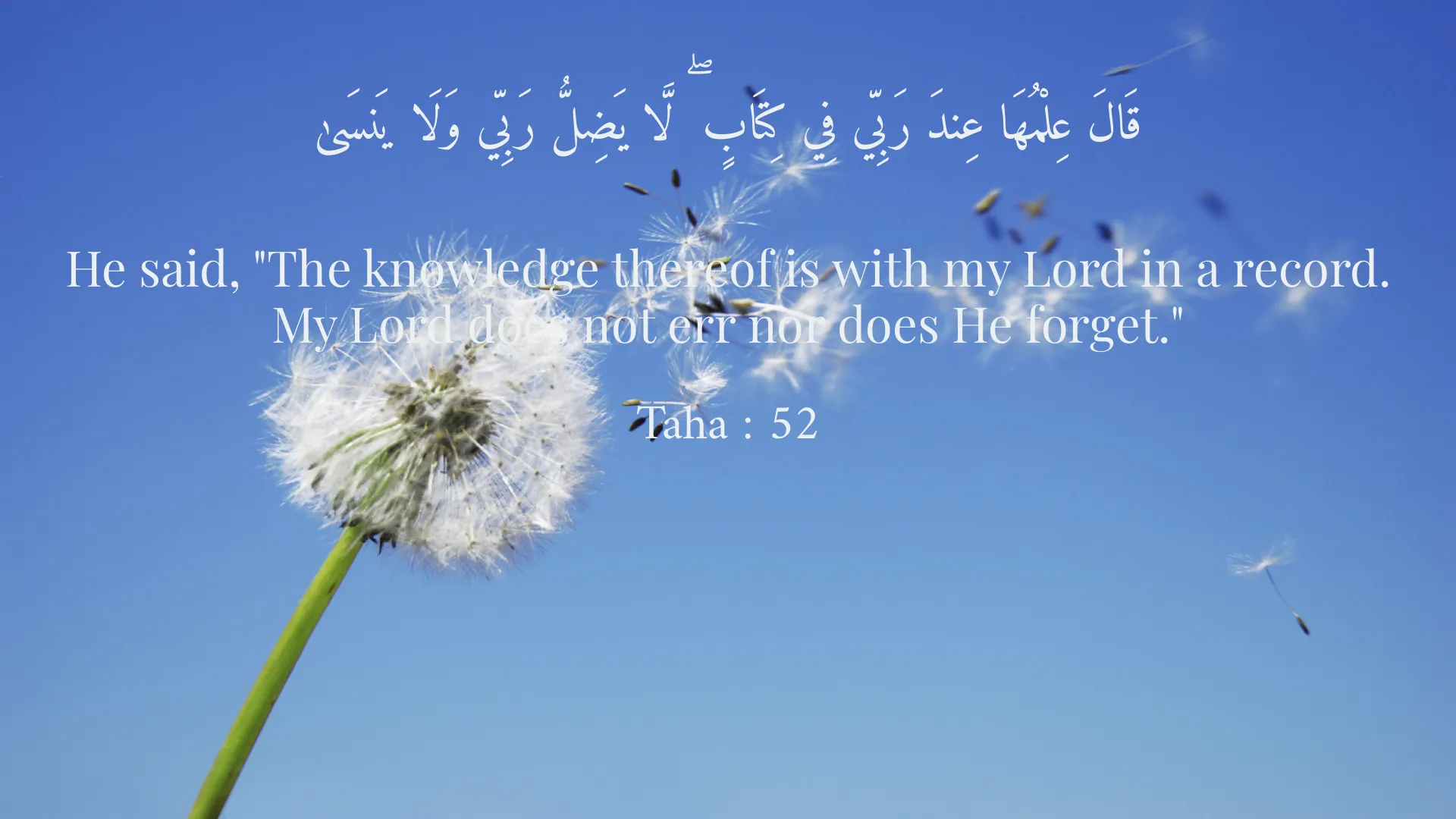Quranic Answer

Understanding the concept of forgiveness, whether from a divine perspective or in human relationships, is one of the deepest and most complex ethical and spiritual issues addressed in the Holy Quran. In answer to the question of whether being forgiven means forgetting, the unequivocal answer is no, forgiveness is not synonymous with forgetting, especially from a divine standpoint. The Almighty God, whose knowledge is infinite and perfect, never forgets anything. The Holy Quran explicitly states that the Lord neither errs nor forgets. For example, in Surah Taha, verse 52, when Moses (PBUH) inquires about the fate of past nations, Allah says: "He said, 'The knowledge thereof is with my Lord in a record. My Lord does not err nor does He forget.'" This verse clearly indicates that divine knowledge encompasses all things, and nothing ever vanishes from His memory. Therefore, when Allah forgives a sin, it does not mean that the sin is erased from His knowledge. Rather, it means that by His mercy and grace, Allah overlooks the punishment and consequence of that sin and removes it from the record of the servant's deeds. Divine forgiveness is a conscious act of mercy and compassion, not an act of amnesia. This forgiveness can include covering the sin, removing its negative effects, and even transforming bad deeds into good deeds for sincere penitents, as stated in Surah Al-Furqan, verse 70: "Except for those who repent, believe and do righteous work. For them Allah will change their evil deeds into good ones. And Allah is Forgiving and Merciful." This transformation and conversion exemplify the boundless power and mercy of Allah, which goes beyond mere forgetting. It is a divine process where Allah's favor and generosity precede His justice, opening the door for repentance and rectification for His servants. Allah, with His perfect knowledge, decides to forgive, and this voluntary act adds greater value and depth to the concept of forgiveness. Regarding forgiveness in human relationships, the general principle that forgiveness does not mean forgetting also holds true, but with differences rooted in human limitations. When one person forgives another, they usually cannot completely erase the memory of the event that caused the harm. Human memory, especially when faced with painful experiences, does not operate in a way that can simply delete them. Instead, forgiveness in the human sphere means letting go of anger, resentment, bitterness, and the desire for revenge. In other words, to forgive is a conscious choice to end the internal conflict caused by the harm, and not to allow that event to disturb the life and inner peace of the forgiving individual. This does not mean overlooking the reality of the harm done, but rather releasing the heavy burden of negative emotions associated with it. The Holy Quran also encourages believers to pardon and overlook. In Surah An-Nur, verse 22, it is stated: "And let them pardon and overlook. Would you not like that Allah should forgive you? And Allah is Forgiving and Merciful." This verse shows that humans forgiving one another also paves the way for divine forgiveness, and this act is more about turning a new page from the past and starting anew in the relationship or in one's personal life, rather than completely erasing memory. The wisdom in remembering is so that one can learn from experiences and maintain healthy boundaries in future relationships. Completely forgetting a harm could lead to its repetition or to being placed in similar dangerous situations again. Therefore, forgiveness is a conscious choice to be freed from the shackles of the past and to move towards a more peaceful future, while the lessons learned from the experience still remain. This empowers the individual and allows them to grow and progress without being negatively affected by the past. Ultimately, forgiveness, whether divine or human, is a noble act of mercy, clemency, and liberation that is built upon complete awareness, and it never means the erasure of reality from the mind or knowledge. Rather, it means a change in perspective and behavior towards that reality. This process not only helps improve relationships but also contributes to one's spiritual and mental well-being, guiding them towards peace and salvation.
Related Verses
قَالَ عِلْمُهَا عِندَ رَبِّي فِي كِتَابٍ ۖ لَّا يَضِلُّ رَبِّي وَلَا يَنسَىٰ
He said, "The knowledge thereof is with my Lord in a record. My Lord does not err nor does He forget."
Taha : 52
وَلْيَعْفُوا وَلْيَصْفَحُوا ۗ أَلَا تُحِبُّونَ أَن يَغْفِرَ اللَّهُ لَكُمْ ۗ وَاللَّهُ غَفُورٌ رَّحِيمٌ
And let them pardon and overlook. Would you not like that Allah should forgive you? And Allah is Forgiving and Merciful.
An-Nur : 22
إِلَّا مَن تَابَ وَآمَنَ وَعَمِلَ عَمَلًا صَالِحًا فَأُولَٰئِكَ يُبَدِّلُ اللَّهُ سَيِّئَاتِهِمْ حَسَنَاتٍ ۗ وَكَانَ اللَّهُ غَفُورًا رَّحِيمًا
Except for those who repent, believe and do righteous work. For them Allah will change their evil deeds into good ones. And Allah is Forgiving and Merciful.
Al-Furqan : 70
Short Story
In Sa'di's Golestan, it is recounted that a just king banished one of his ministers due to a grave error. Sometime later, the same minister, through his courage and wisdom, saved the country from a great danger. The king reinstated him and granted him an even higher position. His courtiers asked the king, "How did you forgive his past mistake and forget it?" The king smiled and said, "I did not forget his mistake, for forgetting is a sign of heedlessness. But I removed the resentment from my heart and overlooked his past, because his present virtue outweighed his past error. Forgiveness is closing the chapter of animosity, not erasing memory." And thus, the minister compensated for his past with greater loyalty and effort, and the king, with his wisdom, found a heart full of peace and built a more stable kingdom.